Randy Alcorn's Blog, page 213
May 23, 2012
Bad Doctrine is a Cruel Taskmaster
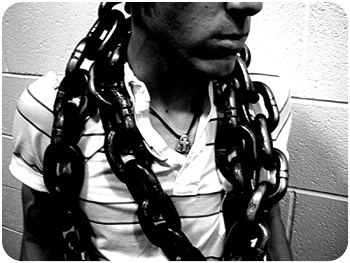 When I came across this statement somewhere, that bad doctrine is a cruel taskmaster, it stuck with me. I asked EPM staffer Julia Stager to provide some verses demonstrating it, and I added my summary statements to hers.
When I came across this statement somewhere, that bad doctrine is a cruel taskmaster, it stuck with me. I asked EPM staffer Julia Stager to provide some verses demonstrating it, and I added my summary statements to hers.
Jeremiah 7:31 – Bad doctrine can make you think you are pleasing God by doing things God most detests.
And they have built the high places of Topheth, which is in the Valley of the Son of Hinnom, to burn their sons and their daughters in the fire, which I did not command, nor did it come into my mind.
Psalm 40:6 – Bad doctrine makes you think that all sacrifices, even self-righteous ones, make you more pleasing to God.
In sacrifice and offering you have not delighted, but you have given me an open ear. Burnt offering and sin offering you have not required.
Matthew 23:1-7 – Bad doctrine can offer you rules that enslave you, and even “good” doctrine (technically accurate) can be twisted to “bad” doctrine by adding regulations that feed your self-righteousness when you manage to keep them.
1 Then Jesus said to the crowds and to his disciples: 2 The teachers of the law and the Pharisees sit in Moses’ seat. 3 So you must be careful to do everything they tell you. But do not do what they do, for they do not practice what they preach. 4 They tie up heavy, cumbersome loads and put them on other people’s shoulders, but they themselves are not willing to lift a finger to move them.
5 Everything they do is done for people to see: They make their phylacteries wide and the tassels on their garments long; 6 they love the place of honor at banquets and the most important seats in the synagogues; 7 they love to be greeted with respect in the marketplaces and to be called ‘Rabbi’ by others.
Romans 1:21-23, 31-32 – The darkness of bad doctrine fosters more and more bad doctrine, and with it more and more darkness.
21 For although they knew God, they neither glorified him as God nor gave thanks to him, but their thinking became futile and their foolish hearts were darkened. 22 Although they claimed to be wise, they became fools 23 and exchanged the glory of the immortal God for images made to look like a mortal human being and birds and animals and reptiles.
31 they have no understanding, no fidelity, no love, no mercy. 32 Although they know God’s righteous decree that those who do such things deserve death, they not only continue to do these very things but also approve of those who practice them.
Colossians 2:20-23 – Bad doctrine with legalistic rules fails to empower us to live holy lives.
20 Since you died with Christ to the elemental spiritual forces of this world, why, as though you still belonged to the world, do you submit to its rules: 21Do not handle! Do not taste! Do not touch!”? 22 These rules, which have to do with things that are all destined to perish with use, are based on merely human commands and teachings. 23 Such regulations indeed have an appearance of wisdom, with their self-imposed worship, their false humility and their harsh treatment of the body, but they lack any value in restraining sensual indulgence.
Job 4:7-8 – Bad doctrine tells us all suffering is our fault. Listen to one of Job’s friends:
7 “Consider now: Who, being innocent, has ever perished?
Where were the upright ever destroyed?
8 As I have observed, those who plow evil
and those who sow trouble reap it.
Job 8:4-7 – Bad doctrine says suffering is always a punishment from God, and if you please God you will not suffer.
4 When your children sinned against him,
he gave them over to the penalty of their sin.
5 But if you will seek God earnestly
and plead with the Almighty,
6 if you are pure and upright,
even now he will rouse himself on your behalf
and restore you to your prosperous state.
7 Your beginnings will seem humble,
so prosperous will your future be.
Job 4:17-19 – Bad doctrine tells us God does not care about us.
17 ‘Can a mortal be more righteous than God?
Can even a strong man be more pure than his Maker?
18 If God places no trust in his servants,
if he charges his angels with error,
19 how much more those who live in houses of clay,
whose foundations are in the dust,
who are crushed more readily than a moth!
Ecclesiastes 1:2-3 – Bad doctrine fosters a false worldview that leads to fatalism and depression.
2 “Meaningless! Meaningless!”
says the Teacher.
“Utterly meaningless!
Everything is meaningless.”
3 What do people gain from all their labors
at which they toil under the sun?
Bad doctrine versus good doctrine, as laid out in 1 Timothy 4:
1The Spirit clearly says that in later times some will abandon the faith and follow deceiving spirits and things taught by demons. 2Such teachings come through hypocritical liars, whose consciences have been seared as with a hot iron. 3They forbid people to marry and order them to abstain from certain foods, which God created to be received with thanksgiving by those who believe and who know the truth. 4For everything God created is good, and nothing is to be rejected if it is received with thanksgiving, 5because it is consecrated by the word of God and prayer.
6If you point these things out to the brothers, you will be a good minister of Christ Jesus, brought up in the truths of the faith and of the good teaching that you have followed. 7Have nothing to do with godless myths and old wives’ tales; rather, train yourself to be godly. 8For physical training is of some value, but godliness has value for all things, holding promise for both the present life and the life to come.
9This is a trustworthy saying that deserves full acceptance 10(and for this we labor and strive), that we have put our hope in the living God, who is the Savior of all men, and especially of those who believe.
11Command and teach these things. 12Don’t let anyone look down on you because you are young, but set an example for the believers in speech, in life, in love, in faith and in purity. 13Until I come, devote yourself to the public reading of Scripture, to preaching and to teaching. 14Do not neglect your gift, which was given you through a prophetic message when the body of elders laid their hands on you.
15Be diligent in these matters; give yourself wholly to them, so that everyone may see your progress. 16Watch your life and doctrine closely. Persevere in them, because if you do, you will save both yourself and your hearers.

May 21, 2012
What would you say to someone who doesn’t believe Jesus is God?
A blog reader asked, "What would you say to a sweet Christian friend who doesn’t believe that Jesus is God? She also disagrees with John 1:1 and says it is unclear in the Greek. But she is not a Jehovah’s Witness."
John 1:1 says, “In the beginning was the Word, and the Word was with God, and the Word was God.” That is the first verse I ever memorized in Greek (and about the only one I still remember.) What it’s saying in the Greek is what is self-evident in the English translation—that Jesus was with God the Father in the beginning, and that He himself was God. From before time, God the Father and God the Son co-existed along with God the Holy Spirit (not mentioned specifically here).
Some people say, “We could translate that verse as, ‘The Word was a God.’” There are other passages in which you could insert the word “a”, and it is sometimes done. But in this particular passage, it is very clear that it is saying, “In his essence, Jesus was God.”
 We’re told in verse 14, “The Word became flesh and made his dwelling among us. We have seen his glory, the glory of the one and only Son, who came from the Father, full of grace and truth.” Jesus is the eternally begotten Son of the Father, but He is not a created being. He was with the Father and the Spirit in the beginning. He is the infinite, eternal, never-brought-into-existence, ever-preexistent God.
We’re told in verse 14, “The Word became flesh and made his dwelling among us. We have seen his glory, the glory of the one and only Son, who came from the Father, full of grace and truth.” Jesus is the eternally begotten Son of the Father, but He is not a created being. He was with the Father and the Spirit in the beginning. He is the infinite, eternal, never-brought-into-existence, ever-preexistent God.
Someone can say they disagree with John 1:1 or that interpretation, but they are disagreeing with what the Bible clearly says. We know this because Jesus’ deity is evident not only in this verse, but also repeatedly in the gospel of John. For instance, in John 8, Jesus is talking to a group of Jewish people that includes the teachers, scribes, and Pharisees. He says, “Before Abraham was, I am.” It’s significant that He doesn’t just say, “I existed before Abraham,” but “before Abraham was I am”, because He is taking on the name of Yahweh—“I AM WHO I AM”—that God used when He revealed Himself to Moses (Exodus 3:14). Jesus was stating that as the Son of God, He was God—the eternal, pre-existent God of the Old Testament.
Some people say, “Well, that’s not how I interpret that passage”, or “He didn’t really mean that. He meant this…” Well, how did the crowd who heard Him interpret it? We’re told they picked up stones to stone Him. Why? Because it was blasphemy for a man to claim to be God. Clearly even His enemies understood what He was claiming.
If you look in the Gospel of John, it is full of “I am” statements from Jesus: “I am the bread of life,” “I am the gate,” “I am the Good Shepherd,” and “I am the light of the world.” It’s not just these things He’s emphasizing; it’s the very words, “I am.” This repeated theme establishes Him as deity.
Titus 2:13 talks about “our great God and Savior, Jesus Christ.” It’s not differentiating between our God the Father, and then our Savior Jesus Christ. No, the way the Greek is constructed, it’s talking about the same person. Jesus is our Savior and He is our God.
Another example is Jesus being called “God.” In John 20:28, He doesn’t rebuke Thomas when Thomas beholds Christ’s resurrection body and says, “My Lord and my God!” In contrast, whenever somebody falls on their knees to worship the angels in Scripture, the angels are terrified, saying, “Don’t you dare do that because I’m not God!” Likewise, when people fell down on their knees to worship Paul and Barnabas, they cried out, “No, no, no. I’m not God!” Why does Jesus not say, “I’m not God” to Thomas? Because He was God. Clearly He accepts worship as befitting to Him as Lord.
 So how do you help people who don’t accept Jesus’ deity? I believe it is to sit down with them and say, “Please understand what this passage says. You can disagree if you want to as to whether Jesus is God, but just understand that Scripture is clearly stating that He is.”
So how do you help people who don’t accept Jesus’ deity? I believe it is to sit down with them and say, “Please understand what this passage says. You can disagree if you want to as to whether Jesus is God, but just understand that Scripture is clearly stating that He is.”
The person who asked the question mentioned Jehovah’s Witnesses, and it brings to mind a story that I haven’t told for many years. There was a woman named Diane who was not only a Jehovah’s Witness, but who also trained other Jehovah’s Witnesses on what to say and how to persuade people when they go door to door. I had a friend who said to me, “Randy, you’ve got to meet this woman. We’ve been talking, and she’s got all her Jehovah’s Witness ideas. Would you be willing to meet with her?”
I said, “I really don’t want to meet her and here’s why: I’ve met with numbers of Jehovah’s Witnesses and numbers of Mormons, and nothing ever comes out of it. We sit down, and I open the Bible. I start talking to them, and they are always just all over the place, bringing their stuff in and not listening. I really don’t want to do it.” (In other words, I didn’t have a good attitude at all about meeting with this woman!)
Finally he said, “Come on. Please meet with her.”
So I begrudgingly agreed, “Okay.”
I went into this meeting with this lousy attitude. Maybe I prayed that God would speak through me to this person, but I certainly didn’t believe that He actually would.
I sat down with Diane and said, “Could we start by agreeing together that we’re going to trust whatever the Bible says? You can turn to any passage that you want; I will turn to any passage I want, and we’ll go from there. We’ll trust the Bible.”
She looked at me and said, “Okay, that’s fine, because I do believe the Bible.”
I thought, Yeah, yeah, yeah. You say that, but what’s going to happen as soon as I open it up?
I turned to John 1:1, thinking I know how she is going to respond, and said, “From years of studying Greek with the Greek teachers, and the Greek expositors I’ve read, here’s what they say about this passage.” Then I turned to John 8 (“Before Abraham was, I am”) and set up the whole context. I looked at the Titus 2 passage and dozens of other passages.
Then I said, “Diane, what does it seem to you like the Bible is saying about Christ?”
She said, slowly and deliberately, with a sort of stunned look on her face, “It sounds like it’s saying that He’s really God.”
I’m thinking, Okay, she’s just going with me for the moment. Then it’s going to collapse at the end when she comes back with all her Jehovah’s Witness stuff.
We went through Scripture for about half an hour, and then I looked at her and asked, “So, bottom line, what do you think based on this? Not what have you been taught as a Jehovah’s Witness, but what do you really think God is saying about Jesus in the Word?”
She responded, “Well, I think it’s saying that I’ve been wrong, and that Jesus is God.”
I shared the Gospel with her, and she prayed and gave her life to Christ. She was disowned by her Jehovah’s Witness family and was baptized in a Christian church, and last I knew she was walking with Jesus.
The moral of the story is don’t give up on people who are in cults. Yes, there is a time when you just realize, this isn’t productive to keep talking with a person who seems never to listen to Scripture. Maybe you think, I’ve tried and tried to witness to this Mormon friend or this Jehovah’s Witness friend. I’ll pray for them, but it’s going to take a miracle of grace to break through. But it is always a miracle for someone to come to faith in Christ. And God does those miracles, sometimes when we least expect him to.
God taught me a very valuable lesson that day. There is no question in my mind that it was not my wit, wisdom, or good attitude (which had started out bad) that won this woman to faith. It was the power of God’s Holy Spirit at work in her life.

May 18, 2012
Should we literally gouge out an eye that causes us to sin?
A reader of my blog asked: "In Matthew 5:27-32, Jesus said it is better to take out your eye and cut off your hand if it causes you to sin, because that is better than going to hell. Why, then, don’t Christians actually do that? If we take what He said as how we should live, and obey what He says, why just take the parts we feel we can do and ignore what we can’t or what we’re not willing to do?"
Understanding this statement is a much bigger problem for those of us who are reading Jesus’ words today than it would have been for the people who were actually hearing Jesus say this. Why? Because it was a common way of speaking. There are even technical terms for an expression like that (such as hyperbole). It is something that is designed to be an obvious overstatement that is exaggerated to make a point. With that understanding, “Pluck out your eye and cut off your hand” is a way of saying, “Deal radically with sin.”
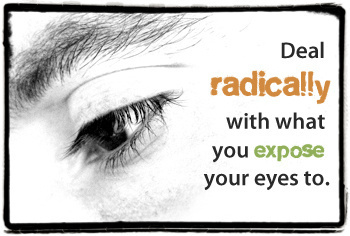 What makes it evident that this is not really what Jesus wants us to do (aside from the fact that He created our bodies and we’re not to destroy them) is that it really wouldn’t solve the problem anyway. If you put out your right eye, you can still put your left eye on what incites you to lust. If you put out your left eye, you can still lust in your heart and in your mind. Can a blind person lust? Of course. Doesn’t this prove the eye per se is not the source of our sin problem? If you cut off your hand, is that going to keep you from stealing? No, you can steal with the other hand. The point is, the sin nature is not ultimately addressed through the cutting off of body parts.
What makes it evident that this is not really what Jesus wants us to do (aside from the fact that He created our bodies and we’re not to destroy them) is that it really wouldn’t solve the problem anyway. If you put out your right eye, you can still put your left eye on what incites you to lust. If you put out your left eye, you can still lust in your heart and in your mind. Can a blind person lust? Of course. Doesn’t this prove the eye per se is not the source of our sin problem? If you cut off your hand, is that going to keep you from stealing? No, you can steal with the other hand. The point is, the sin nature is not ultimately addressed through the cutting off of body parts.
The eye represents what we see. The hand represents what we do. What I think Jesus is saying here is, “Deal radically with what you expose your eyes to. Deal radically with what you handle and do, the places you go, and what you touch.”
A much better, more biblical application than literally plucking out your eye would be to turn your eyes away from sources of temptation toward evil. For example, if you are struggling with lust, then turn that television off. Don’t watch that movie. Don’t read that novel. Don’t go to the beach where girls are dressed like that because the moment you turn away from one, you’ll be looking at another. Don’t take a stroll in a mine field, stay away from it.
Taking radical steps to stay away from temptation might still seem radical to us, but it isn’t nearly as radical as literally plucking out our eyes.
The same is true with the internet. If you’ve taken all the precautions, including having a filter, but have proven you still aren’t staying away from internet pornography, then totally cut off internet access, including giving up your smart phone.
You may say, “But wait a minute. I’ve got to have internet!” No. Actually, if you look up internet in a concordance, you won’t find it in the Bible. The World Wide Web is not in the Bible, nor is Google or Facebook or Twitter. You don’t have to have these things. If it seems like it would be radical to not have them, fine—be radical! Again, it’s not as radical as literally chopping off your hand.
I encourage people to think in terms of what this means for television. There are people who should not have cable TV. Network TV is bad enough; it may just give us a limited number of options that sometimes are bad, whereas it is almost infinite when you have hundreds of channels through cable. You can always find something inappropriate in a moment of weakness.
 The solution if you struggle with this? Don’t have a television. Early in our marriage, Nanci and I went for years without having a television. We have one now, because I think we know better how to use it. But we don’t have cable, and I don’t want it. I don’t want more options (even for the things that are healthy and don’t dishonor Christ) to take me away from the limited amount of time I have already to read God’s Word, to read great fiction and non-fiction, to talk to my neighbor about Christ, to reach out, and to do what God has called me to do.
The solution if you struggle with this? Don’t have a television. Early in our marriage, Nanci and I went for years without having a television. We have one now, because I think we know better how to use it. But we don’t have cable, and I don’t want it. I don’t want more options (even for the things that are healthy and don’t dishonor Christ) to take me away from the limited amount of time I have already to read God’s Word, to read great fiction and non-fiction, to talk to my neighbor about Christ, to reach out, and to do what God has called me to do.
So with this hyperbolic language (which is not misleading because people knew it was hyperbole), I think Jesus is simply saying, “Be radical. Take whatever steps are necessary to keep yourself away from the temptation to sin. Follow me wholeheartedly.”

May 16, 2012
Will we intervene for the least of these?
 I deeply appreciated the blog by Tim Challies I’ve included in this blog. The responses on his post are worth reading too, and are very revealing, both the positive and negative ones.
I deeply appreciated the blog by Tim Challies I’ve included in this blog. The responses on his post are worth reading too, and are very revealing, both the positive and negative ones.
As for Christians standing outside abortion clinics, I thank God they are there to obey Proverbs 31:8-9: “Speak up for those who cannot speak for themselves, for the rights of all who are destitute. Speak up and judge fairly; defend the rights of the poor and needy.”
Their presence is the voice of an alternative. It is a warning for those about to kill their children. A warning is not the same as a condemnation. If someone is about to step off a cliff, for me to say “Stop!” may appear to some to have this subtext: “You are a terrible person and I condemn you for it.” But the real subtext may be, “You’re about to fall to your death, and I love you enough to not want you or your baby to die.”
A pastor once shared a heartbreaking story about a post-abortive woman he had counseled. As she was leaving his office, he said “Can I ask you a question? If there would have been anyone outside the clinic when you went to get your abortion, what would you have done?” She said that before she left her house she had decided that if there was anyone standing outside the clinic in opposition, she wouldn’t go ahead with the abortion. Tragically, there was no one there. This woman’s story—which likely is not unique to her—should break our hearts, and move us to action.
Listen to what Tim has to say:
Ashamed and Disappointed
by Tim Challies
Last week in Louisville I ended up staying in a hotel that was a little bit off the beaten path, so to speak, just outside the downtown core, out where most of the storefronts were boarded up and only fast food restaurants and strip clubs kept their lights on at night. Every time I walked from my hotel to the conference or from the conference to the hotel, I had to pass by an abortion clinic, a building with a sign that declared it a “Women’s Surgical Center.”
One morning, as I walked by that clinic, passing directly in front of it, I saw that three or four people were just outside, holding signs and passing out pamphlets. I was taken aback; here in Ontario it has long since been declared illegal to protest outside a clinic. Yet there they were, quietly and peacefully protesting.
Standing a little bit apart from those people were two men and a woman, each wearing an orange vest emblazoned with “Escort.” These three people were escorting young women from the parking lot to the clinic, walking them past the protestors, all of whom were behaving peacefully; two were seated on the sidewalk praying, the others were calling to the women and saying, “Please don’t kill your baby. You don’t have to do this!” One young woman walked by them—she couldn’t have been older than sixteen or seventeen—with her mother beside her, her head down. She quietly took a pamphlet and disappeared inside. The people on the sidewalk kept praying. A moment later another woman, perhaps in her twenties or thirties, passed by the protestors and went inside as well.
All of that unraveled in the few seconds it took for me to pass by—a very powerful few seconds. I was shocked and gravely disappointed—shocked again, shocked anew, that we allow this to happen, that our society not only allows this to happen, but is actually complicit in this genocide. And I was so gravely disappointed in myself, so ashamed. I felt no animosity toward those young women. They were doing only what they have been instructed to do, what parents and friends and guidance counselors and maybe even pastors have told them is the happiest outcome. “It’s just like having a tumor removed. It’s just a small surgery; it will be over before you know it. It’s better this way.”
That little girl who went in there was a sinner behaving like a sinner, an unbeliever acting out of unbelief, desperate to rid herself of the evidence of her sin or perhaps the evidence of a sin committed against her. She was wrong, of course, and will have to give an account for what she has done; but I harbor no ill-will for her. It is me I was disgusted with and me I was ashamed of. Disgusted that I could watch that and not do something, ashamed that I have no idea what to do and that I have done so little. I don’t even know what I ought to do. Cry out to God and ask him to intervene? Demand answers from God as to how he can allow this to go on? What do you do, how do you react, when you see someone about to commit murder? I, we, do nothing. We feel disturbed, we feel bad, we feel guilty and ashamed, and we walk away. This atrocity has been going on all around me all of my life and I do so very little about it. I stopped for a moment, felt revulsion, and then went on my way and ate breakfast.
A couple of years ago I was reflecting on the sins that we, as Christians in this day and this time, tend to tolerate. What I said about abortion then still rings true.
Christians hate abortion. We believe that God is the creator of life and believe that life begins at the very moment of conception. We believe that each life is a gift, whether it is a life that is wanted or unwanted by the mother, whether it is a life that will be “normal” or one that will be marked by profound disability. All humans are created in the image of God and, therefore, all life has intrinsic value. And if all of this is true, then of course we despise abortion and long to see it abolished. We hate it so much that we do…well…what do we do? If we are honest with ourselves we have to admit that most of us do not do much of anything.
What have you done in the past week, the past month, the past year to actively combat abortion? If you are like me, you’ve done very little. You may have prayed that God will change hearts and change the laws of the land. And this is good, of course. If there is to be any change, prayer will be instrumental. You may have spoken to some friends or neighbors or family members, trying to convince them of the value of life. But very few of us have done anything substantial, anything that could possibly one day appear in a history text. Few of us move beyond the “I hate it” stage into some form of active combat.
If we imagine Christians a century in the future, or perhaps two centuries, how will this kind of action, or inaction, appear to them? What will the verdict of history be? How will we be able to explain our complacency? They will read our words, all perfectly preserved in digital media, and they will know that we wrote and spoke about our hatred for abortion and our desire to see it abolished. But will they see actions to go along with all of those words? Maybe we are just waiting for it to die a natural death.
They may judge us harshly for this. They may have every right to.
My executive assistant, Kathy Norquist, who has shared about praying outside of an abortion clinic, posted a comment in response to another comment on Tim’s blog:
In response to: By the time they get to the clinic, their minds are made up. They are already facing a difficult, terrible decision. They are already questioning their future and what it means to make a moral decision. *They already feel judged.*Seeing protestors who (let's be honest) are judging them as sinners, unbelievers, and murderers, is not going to change their minds.
This grieves my heart because I stand in front of an abortion clinic (monthly) and do not feel judgment towards the women going in. How do you know what the people in front of the clinics are thinking? Isn't that judging someone else’s heart which we're never to do? Yes, we are to judge actions, but not motives/hearts.
My friends and I are there to offer love, compassion and truth, in hopes that a baby's life will be saved and a woman will be spared the pain and suffering of the choice she is about to make. Thank you, Tim, for this honest and compelling post. For those who don't know what to do, I'd encourage you to simply stand in front of a clinic and pray. The more people the greater the impact. And if you hold an appropriate sign, that impacts people driving by and causes conversations in cars, and lets the world know what is going on inside the building. It's an opportunity to shine the light of Christ in a very dark place. Like John Piper says, God is always doing a thousand other things than we know or think behind the scenes. It is a privilege to stand in the darkness and offer the light. It would be wonderful to see hundreds of people in front of every abortion clinic in America, praying and seeking to reach out in Christ's name.

May 14, 2012
How does one gain the courage to make personal sacrifices for God?
A blog reader asked: "How did you do it? I would love to think I’m courageous enough to make the sacrifices you made in pursuit of the Father. But even thinking about cutting back on my cable TV packages makes me weep. :) Have you always been able to make deep sacrifices in your life? Is that more of a gift or a skill?"
Let me begin by clearing up that I have not made great sacrifices in my life; rather, I have made some sacrifices along the way. I assume you are probably referring to my being arrested, going to jail, and losing my job as a pastor back in 1989-1990 when I was involved in civil disobedience for unborn children. Maybe you’re also referring to the fact that 100% of the royalties from my books go to various ministries.
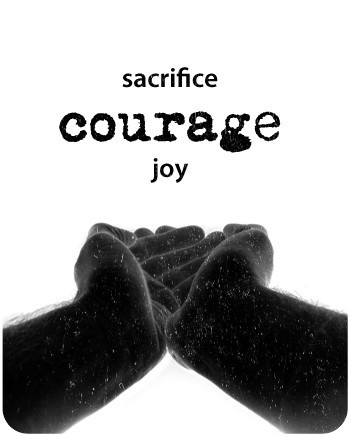
Here’s what I mean when I say I don’t consider those things to be great sacrifices: God calls us all to do certain things in our lives (although He doesn’t call us all to do the same things). What I have done is exactly what every one of us can and should do: that is, when we hear God speaking to us in an area—through His Word, the counsel of others, and in our hearts when we feel a compulsion from the Holy Spirit—we should do it.
Someone might say, “I have an uncle who is resistant to the Gospel, and he has been diagnosed with cancer. He’s on my heart and my mind. I feel like God is directing me to go share the Gospel with him.”
Does it take courage to do that? Yes, it takes courage, but on the other hand, let’s compare it to the courage of a martyr, perhaps someone who’s taken into an arena and killed for their faith. I have to think, “Is anything like that going to happen to me? What’s the worst case scenario?”
I often ask myself when I’m sitting next to someone on the plane, “If I share the Gospel with this person, what’s the worst that can happen?” Are they going to disapprove of me? Okay. If they do, so what? What does that mean in the long haul? Is it really that big of a deal?
But if I needed to share the Gospel with an uncle, then it would be important for me to ask people to pray for me, and then open my mouth and say the words to him. Once I start speaking and sharing the good news, it actually gets easier because now I’m committed.
There is a joy in sacrificing for Christ by doing things like standing up for the innocent. There is a joy in giving away a large portion of your income. In Acts 20:35 (the one saying of Jesus quoted outside of the Gospels that isn’t included in them) our Lord Jesus said it is more blessed to give than to receive. The word translated “blessing” means “happy-making.” There’s a huge happiness that comes in doing what God has called us to do.
By all means we should exercise courage. I think we don’t have enough courage in our lives—I know I don’t. But in my experience, when I have followed the Lord step by step, it doesn’t hit me all at once. Rather, it comes in increments. For example, in the area of giving, it started with following Christ by giving this much, and then giving more, and now giving even more. With the unborn children, it started with Nanci and me opening our home to a pregnant girl and helping place her child up for adoption. I served on the board of a crisis pregnancy center, and we gave substantially more of our income to support prolife work. We also participated in Life Chain (holding up signs that read “Abortion Kills Children”), went to abortion clinics, and did sidewalk counseling (at first not disobeying the law, then standing in front where we could be arrested). All of that was gradual.
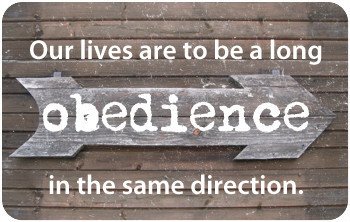 So I would encourage you to follow the Lord wherever He is leading you, then depend upon Him to give you more courage to take the next step. Our lives are supposed to be what Eugene Petersen calls “a long obedience in the same direction.”
So I would encourage you to follow the Lord wherever He is leading you, then depend upon Him to give you more courage to take the next step. Our lives are supposed to be what Eugene Petersen calls “a long obedience in the same direction.”
Following Christ requires taking up your cross daily, which means little sacrifices made repeatedly again and again and again. One day you will wake up and realize (or if you are humble you may not realize) you have become a bolder and more courageous person. That should not be the exception, but the norm for the Christian life.
I’d like to share one final story, which I tell in a couple of my books, including Money, Possessions and Eternity. It illustrates the fact that in the body of Christ, we need to encourage and raise the bar for each other when it comes to courageously following Christ and obeying the leading of the Holy Spirit.
Years ago there was a single young man in our church who had a substantial income in his profession. He told me, “I feel the Lord is leading me to sell my house and give away all the money to the poor and to world evangelism.”
I told him, “Good for you. I am really excited for you, because God will do great things in your life when you follow Him this way.” He was so joyful. He was just bubbling.
I didn’t see him until six or eight weeks later. When I did, I noticed he didn’t look as happy as the last time. The joy was gone. I came up to him and asked, “So how’s it going? Have you sold the house yet? Have you decided which ministries you’re giving to?”
He said, face downcast, “You know, I shared that idea with my Growth Group and they talked me out of it. They convinced me that I was being foolish. They said the Lord wouldn’t want me to do that. That would be unwise.” (His Growth Group consisted of older, more “mature” Christians.)
I looked at him and said, “If God is leading you to do that, do it! Don’t listen to other people.”
Unfortunately, he never ended up selling his house. And I remember what that said to me. It was a powerful illustration that we as Christians should be the last people to discourage each other from doing what God has laid on people’s hearts—what we are so quick to call “unwise.”
That man could have given away his house and still easily paid rent for a nice apartment and been in the top 98-99% of the world’s wealthy. And a group of older Christians in a local church talked him out of it! We should be doing the opposite. We should be raising the bar for each other, becoming more courageous and bold, following Christ more wholeheartedly, and sacrificing more with joy.

May 11, 2012
Biola University: a Place for Students to Nurture Their Faith
 Earlier this year, I spent a wonderful and exhausting four days at Biola University. I was certainly familiar with Biola by reputation, but my experience there exceeded expectations. What a pleasure it was to be in a place where God’s Word is actually believed and the cutting edge thing to do is not to depart from Scripture, but to be about Jesus and to start with the authority of His Word.
Earlier this year, I spent a wonderful and exhausting four days at Biola University. I was certainly familiar with Biola by reputation, but my experience there exceeded expectations. What a pleasure it was to be in a place where God’s Word is actually believed and the cutting edge thing to do is not to depart from Scripture, but to be about Jesus and to start with the authority of His Word.
I loved the students I met and taught in chapels and a number of different classes, on subjects ranging from financial stewardship (they'd read my book Managing God's Money) to a Heaven Q & A with Torrey Honors Institute, and a three hour discussion of my novel Safely Home with 16 Torrey students who had actually read it! (Biola has posted the full video of part 1 and part 2 of the chapel messages on financial stewardship.)
I loved the student leaders I had lunch with (along with my student friends Matt Fier and Erin Jeffries), and Wes Wilmer, Rick Bee, Todd Pickett, Lisa Ishihara, Stetson Butler (and wonderful wife Katy) and other staff and faculty I hung out with (including philosophy teacher Chris Franklin).
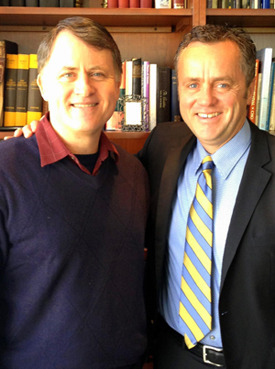 I loved my time with Biola President Barry Corey, who explained to me how they seek to protect the university from biblical compromise and theological drift. I have been disappointed with many Christian liberal arts colleges I have encountered, where some or many professors no longer hold to biblical inerrancy, and many students' faith in Scripture and walk with Christ sadly erodes. I was impressed not only by Biola's doctrinal orthodoxy, but also by the spiritual vitality I saw in the president, faculty, staff and students I met. Sound academics, yes, but more importantly I sensed the presence of God's Spirit. It was a delightful breath of fresh air. For students and parents of students looking into a Bible-believing, Christ-exalting Christian liberal arts college, I highly recommend you consider Biola.
I loved my time with Biola President Barry Corey, who explained to me how they seek to protect the university from biblical compromise and theological drift. I have been disappointed with many Christian liberal arts colleges I have encountered, where some or many professors no longer hold to biblical inerrancy, and many students' faith in Scripture and walk with Christ sadly erodes. I was impressed not only by Biola's doctrinal orthodoxy, but also by the spiritual vitality I saw in the president, faculty, staff and students I met. Sound academics, yes, but more importantly I sensed the presence of God's Spirit. It was a delightful breath of fresh air. For students and parents of students looking into a Bible-believing, Christ-exalting Christian liberal arts college, I highly recommend you consider Biola.
In an article for Biola Magazine titled “The Soil of the Soul of our Students,” President Corey wrote the following:
Colleges, Christ-centered or not, provide no guarantee students will graduate with faith intact. If colleges were neutral on matters of faith, students may be able to navigate their way through, “working out their salvation.” Few colleges are in fact faith-neutral. Those colleges that take no position on faith often have an undeclared and ideological bent toward dismantling faith. We know the stories. As one commentator recently wrote in a national publication, the leftward leanings of Western universities is clear, though they “still claim they have neither a secularist nor a political agenda.”
I stumbled on an article in The Atlantic Monthly admitting as much. Philip E. Wentworth wrote:
To say that college does something to the average student’s religion is to state a truth which will be conceded by anyone who has given the matter a moment’s thought. Nine young men and women out of ten who will receive their degrees this June would probably admit, if they were called to testify, that education has acted as a poison to their faith. In many instances the virus generated by the reasoning processes induces only mild distemper of skepticism, but in others it works like an acid, eating its way into the bump of credulity until in the end this estimable organ is completely corroded. Devout parents and clergymen have frequently observed this phenomenon and deplored it.
What Mr. Wentworth meant when he talked about those who “receive their degrees this June” was not June of 2011. His comments were penned 80 years ago. He wrote the article in the 1930s. This faith-dismantling in higher education is nothing new to our generation. Many universities have faculty dead set on doing all they can to upend the faith of a student, a faith they see as narrow and baseless.
A Biola University education is not an ironclad guarantee that a student’s faith won’t be shaken or even upended. But this I do know: Our community of faculty and staff cares as much for the life of a student’s soul as they do the life of the mind. We want to come alongside parents in continuing the values nurtured in the home and in the church. We do so by being intentional about providing students the opportunities and relationships to nurture their faith.
Society will be swayed most by its most educated people. Today’s young people are tomorrow’s leaders in the church and the culture, and in the global arena. While in college their worldview will be shaped at the core of their being, for better or for worse. Jesus commanded us to love the Lord our God with all our heart, soul, strength and mind, and to love our neighbors. The mind and heart are profoundly affected by a university campus with a Christ-centered rather than a self-centered world view. Character growth and the fruit of the Spirit are most likely to be cultivated when evident in the lives of most of the faculty, staff and students.
 The moral failures we see in politicians and business leaders are often the shriveled toxic fruit of minds and hearts that were not shaped for God’s kingdom. On the other hand, many of the captivating Christ-serving and others-serving lives we see are directly attributable to what happened in the hearts and minds of young people not only in their homes, but while in college.
The moral failures we see in politicians and business leaders are often the shriveled toxic fruit of minds and hearts that were not shaped for God’s kingdom. On the other hand, many of the captivating Christ-serving and others-serving lives we see are directly attributable to what happened in the hearts and minds of young people not only in their homes, but while in college.
There is something to be said for investing in Christian leadership development. We need to make long-term investments in people who will bring long-term solutions to recurring problems around the world. For instance, we need not only to send food and clothing and medicine to get people through a crisis, we also need to send God’s servants who understand culture, economics, business and agriculture, and who can train people how to break out of the cycle of poverty.
The results of investing in a Christ-centered world-impacting education may not always be seen immediately. But decades down the road, when a graduate leads a business, serves in government or science or medicine or the arts, teaches at school or church, and raises their family to the glory of God, the results will be a fruitful harvest from those seeds planted decades earlier.

May 9, 2012
Do you plan to write more fiction?
Someone left a comment on my blog saying, I enjoyed reading your fiction books from Dominion to Safely Home. Is there any plan to write another novel?
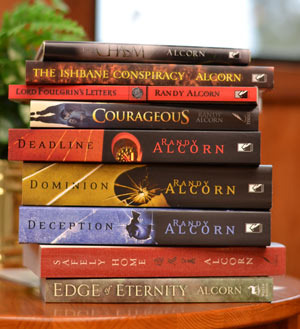 I wrote a book before Dominion, called Deadline, and I’ve written a couple of novels since Safely Home, one of which was Deception. I used the same setting and characters as Deadline and Dominion, although there were many years in between writing them. Deception is the story of Detective Ollie Chandler, who is the viewpoint character. In 2011 I wrote the novel Courageous, which was based on the screenplay for the movie by the same name.
I wrote a book before Dominion, called Deadline, and I’ve written a couple of novels since Safely Home, one of which was Deception. I used the same setting and characters as Deadline and Dominion, although there were many years in between writing them. Deception is the story of Detective Ollie Chandler, who is the viewpoint character. In 2011 I wrote the novel Courageous, which was based on the screenplay for the movie by the same name.
I just finished a short fiction project, a graphic novel (if you’re not familiar with the term, that’s an extended comic book form) that is going to be titled Eternity. It’s a story about the rich man and Lazarus from Luke 16. I’ve been going back and forth with the artist and editor, and it’s been a very fun project. I can’t wait to show off the beautiful artwork, which is being illustrated by a terrific artist who has worked with Marvel Comics.
One of the things I love about this project is that there’s a whole demographic—meaning people of a certain type—who read graphic novels. Many of them are males, though many females read the books as well. What’s interesting is that although fewer young men in our culture are reading traditional books (which saddens me), they are reading these graphic novels. I’m excited to be able to reach that audience. These people may have facial jewelry and tattoos and may be aged anywhere from 12 to 15 years old on up to their twenties or early thirties. They aren’t people you would expect to pick up most of the books I’ve written.
I just love the idea of junior high, high school, and college-aged young people, and older people too, being drawn to a beautifully illustrated graphic novel that contains the gospel, and is based on a powerful story that Jesus told. Elaborating on that story has been very fun for me, though it’s a very short form story, since there’s not that many words in a graphic novel.
For the long haul, this graphic novel is going to be the basis for my next big fiction project with Tyndale Publishers. (It might be called The Rich Man and Lazarus, or possibly something more creative.) It will in essence be me developing the “story behind the story”, which of course will be extended far more than in the graphic novel, with a word count that will be much bigger.
In Luke 16:28 the rich man says he has five brothers still on Earth, and I’m going to tell the story of those five brothers as well as the story of Lazarus, who was brought to the gate every day to beg, and was grateful for any crumbs of food that fell. In the novel, I’ll include a servant in the house named Tobias who comes out and cares for Lazarus. Perhaps one of the brothers will come to faith in Christ while the other brothers totally reject Him. I’m also going to include Jesus himself as a character walking through the streets of Jerusalem, teaching and performing miracles.
So the graphic novel is a very fun project I’ve already written, and will be released October 2012. This has given me a huge head start on writing the full-length novel in the future. Basically, that’s my plan. (If you want to know all about my other novels, several of which I didn’t mention, go to our website and check them out!)

May 7, 2012
Be Not Mere Shadows and Echoes
Doug Gabbert, my friend and an elder at our church, shared the following, by John Piper. It is biblical, God-honoring and powerfully written. Read it prayerfully and thoughtfully.
We are not God. So by comparison to ultimate, absolute Reality, we are not much. Our existence is secondary and dependent on the absolute Reality of God. He is the only Given in the universe. We are derivative. ...We were. He simply is. But we become, "I Am Who I Am" in His name (Exodus 3:14).
Nevertheless, because He made us with the highest creaturely purpose in mind—to enjoy and display the Creator's glory—we may have a very substantial life that lasts forever. This is why we were made ("All things were created through Him and for Him", Colossians 1:16). ...This is why we eat and drink ("So whatever you do, do all to the glory of God", 1 Cor. 10:31). ...This is why we do good deeds, ("Let your light shine before others, so that they may see your good works and give glory to your Father who is in heaven", Matthew 5:16).
That is why we exist—to display the glory of God. Human life is all about God. That is the meaning of being human. It is our created nature to make much of God. When we fulfill this reason for being, we have substance. There is weight and significance in our existence. Knowing, enjoying, and thus displaying the glory of God is a sharing in the glory of God. Not that we become God. But something of His greatness and beauty is on us as we realize this purpose for our being—to image-forth His excellence. This is our substance.
Not to fulfill this purpose for human existence is to be a mere shadow of the substance we were created to have. Not to display God's worth by enjoying Him above all things is to be a mere echo of the music we were created to make.
This is a great tragedy. Humans are not meant to be mere shadows and echoes. We were to have God-like substance and make God-like music and have God-like impact. That is what it means to be created in the image of God (Genesis 1:27). But when humans forsake their Maker and love other things more, they become like the things they love—small, insignificant, weightless, inconsequential, and God-diminishing.
Listen to the way the Psalmist put it: "The idols of the nations are silver and gold, the work of human hands. They have mouths, but they do not speak; they have eyes but they do not see; they have ears but they do not hear, nor is there any breath in their mouths. Those who make them become like them, so do all who trust in them" (Ps. 135:15-18: see also 115:4-8).
Think and tremble. You become like the man-made things that you trust: mute, blind, deaf. This is a shadow existence. It is an echo of what you were meant to be. It is an empty mime on the stage of history with much movement and no meaning.
Dear reader, be not shadows and echoes. Break free from the epidemic of the manward spirit of our age. Set your face like flint to see and know and enjoy and live in light of the Lord. "O house of Jacob, come, let us walk in the light of the Lord" (Isaiah 2:5). In His light you will see Him and all things as they truly are. You will wake up from the slumbers of shadowland existence. You will crave and find substance. You will make God-like music with your life. Death will dispatch you to paradise. And what you leave behind will not be a mere shadow or echo, but a tribute on earth, written in heaven, to the triumphant grace of God.
—John Piper, Pierced by the Word

May 4, 2012
Congratulations to Tyndale House Publishers on their 50th Anniversary
 Congratulations to Tyndale House Publishers on the celebration of their 50th anniversary this year. They’re a great company and have been a pleasure to work with over the years.
Congratulations to Tyndale House Publishers on the celebration of their 50th anniversary this year. They’re a great company and have been a pleasure to work with over the years.
I’m grateful to all my friends at Tyndale for agreeing to publish books I believe God has put on my heart, starting with the first edition of my book Money, Possessions and Eternity back in 1989. It was followed by many other books, including my novel Safely Home, Heaven, and all the other Heaven-related books.
Ron Beers, senior vice president and group publisher, has been a great friend. If not for him, the books Safely Home and Heaven probably wouldn’t have been written, at least not in the forms they’re in now. It was Ron who first asked me, “Would you write a big book on Heaven?”
I am so grateful for and have wonderful memories of Dr. Ken Taylor, the founder of Tyndale House who is now with the Lord. (Dr. Taylor named his company Tyndale House Publishers, after William Tyndale, the 16th century reformer who was burned at the stake for translating the Bible into English.) I remember sitting with Ken and his wife Margaret, along with my wife Nanci, at a Tyndale dinner, talking about things that moved our hearts. The humility and grace of these people was obvious.
 One of the funniest memories I have is Dr. Taylor writing me a letter in the mid-nineties saying that he had just re-read Money, Possessions and Eternity and considered it to be one of the best “poor selling” books Tyndale had ever published! He said the book had made a real impact on him, and expressed regret that the sales hadn’t lived up to what he considered the value of the book. Of course, he had nothing to apologize for, but it seemed to truly bother him. The sweetness and humility of his letter touched my heart, and made me realize I was truly part of a publishing family, of which he was the father. The fact that he had taken time to write this personal heartfelt letter was a real encouragement. (And he would be happy to know that now Money, Possessions and Eternity has sold over 100,000 copies.)
One of the funniest memories I have is Dr. Taylor writing me a letter in the mid-nineties saying that he had just re-read Money, Possessions and Eternity and considered it to be one of the best “poor selling” books Tyndale had ever published! He said the book had made a real impact on him, and expressed regret that the sales hadn’t lived up to what he considered the value of the book. Of course, he had nothing to apologize for, but it seemed to truly bother him. The sweetness and humility of his letter touched my heart, and made me realize I was truly part of a publishing family, of which he was the father. The fact that he had taken time to write this personal heartfelt letter was a real encouragement. (And he would be happy to know that now Money, Possessions and Eternity has sold over 100,000 copies.)
In a time when many Christian publishers are publishing books that are spreading misleading and harmful doctrine, I appreciate Tyndale’s commitment to produce literature consistent with biblical principles and to spread the Good News of Christ around the world. (During the past 40 years, they have distributed over 100 million Bibles, New Testaments, and Bible portions worldwide.)
Through the Tyndale House Foundation, their non-profit arm, they have made thousands of grants to support Christian work, including new translations of the Bible in languages around the world. From 1963 to 2008, the Foundation’s grants totaled $59 million (the equivalent of $139 million in today’s dollars).
Tyndale House—thanks for investing in eternity, and congratulations on your 50th anniversary!

Some Facts about Tyndale House and Their Giving to God’s Kingdom1. Tyndale House gives 10% of pretax income to charitable work.
2. Tyndale House gives all its remaining profit after taxes and expenses to the Tyndale Foundation, which provides hundreds of grants to Kingdom work worldwide, primarily Bible translation in numerous languages, but so much more. This amounts to an average of 5 to 6 million dollars each year.
3. Tyndale House gives away all damaged product. Instead of shredding slightly damaged product, we give it away to various ministries who are thrilled to have it. This amounts to about 1 million dollars each year.
4. All NLT Bible royalties go to the Foundation. Rather than keeping these for himself, Ken Taylor decided at the founding of the company that Bible royalties would go to the Foundation. This amounts to well over a million dollars each year.
May 2, 2012
God-Honoring Rap: Beautiful Life, Persecuted Church and Man Up
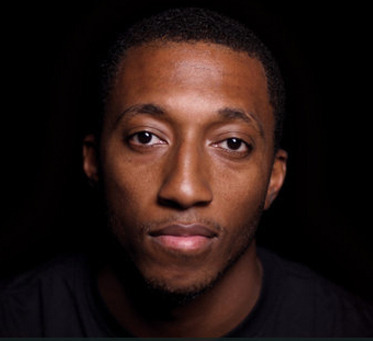 I’ve mentioned before my respect for Lecrae, a Christian rapper. Recently he told his Twitter followers and Facebook fans that he was reading If God Is Good, and posted a photo of the book, calling me a “bad man.” Makes me smile. He’s a good [bad] brother, with an incredible outreach.
I’ve mentioned before my respect for Lecrae, a Christian rapper. Recently he told his Twitter followers and Facebook fans that he was reading If God Is Good, and posted a photo of the book, calling me a “bad man.” Makes me smile. He’s a good [bad] brother, with an incredible outreach.
Here’s one of his videos, titled “Just Like You.” And here’s his classic “Don’t Waste Your Life.”
Watch this great five minute video with his testimony:
Pray for Lecrae, would you? He has an amazing platform, and is surely hated by the enemy of our souls.
 Here are three more videos, featuring Trip Lee, Lecrae and others. Whether or not you like hip hop or rap, I hope you can appreciate young men who are using rap for God’s glory, and calling a generation to the cross of Jesus.
Here are three more videos, featuring Trip Lee, Lecrae and others. Whether or not you like hip hop or rap, I hope you can appreciate young men who are using rap for God’s glory, and calling a generation to the cross of Jesus.
Check out this Trip Lee song, not a live video, but pay attention to the prolife lyrics on the screen. (Andy Abelein, Barlow High School class of 2012, recently recommended this to me. Speaking of which, I graduated from Barlow in the first class that attended there four years. It was a mere...drum roll....40 years ago, in 1972.)
Here’s Trip Lee again, this time in full video with Lecrae, singing out about the persecution of Christians around the world:
Finally, a video with a group of male rappers, including Lecrae and Trip Lee, this time calling upon young men to “Man Up!”
To these musicians and others: Brothers, may you stay strong, stay pure, stay outspoken, and stay close to Jesus.
So, whether you eat or drink, or whatever you do, do all to the glory of God. —1 Corinthians 10:31







